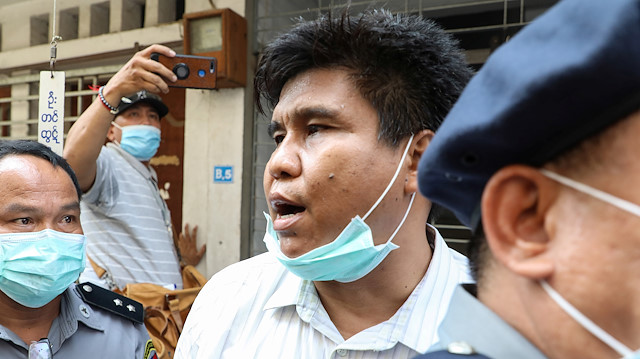
Nay Myo Lin was held for 10 days since being remanded under country's counter-terror law after interview with Rakhine group
A journalist in Myanmar was released from prison 10 days after being held under the country's counter-terrorism law over an interview with an ethnic rebel group in the country's volatile Rakhine state.
Nay Myo Lin, founder and editor of Voice of Myanmar, a local news outlet based in the second-largest city of Mandalay, was arrested on March 30 for publishing an interview with a spokesperson of the Arakan Army, a predominantly Buddhist armed ethnic group engaged in fighting with the country's military.
He was charged in a local court under sections of the law prohibiting organizations and individuals from contacting or associating with outlawed organizations -- a charge carrying a maximum life sentence.
However, police released Nay Myo Lin late on Thursday after the court decided to drop the case, citing insufficient evidence.
"Police told me that it was their mistake, and took me home late last night," he told Anadolu Agency on Friday.
Nay Myo Lin's arrest came several days after Myanmar declared the Arakan Army a terrorist group and "unlawful association."
Police also charged two other journalists from online news sites, one from the Yangon-based Khit Thit Media and the other from the Narinjara based in the Rakhine state capital Sittwe, under the counter-terrorism law for similar coverage.
"Since I got arrested, I told them [police] that there is nothing wrong for a journalist interviewing a rebel group or its spokesperson," said Nay Myo Lin.
"I don't know what exactly the motive [of the arrest], but it is a clear message that we, the journalists, could be arrested, charged and jailed at any point," he said.
Myanmar came under local and international criticism for the deepening crackdown on independent media after the arrest.
Nay Myo Lin was placed in a small cell for inmates awaiting execution in Obo prison in the Mandalay region since he was remanded by the court on March 31.
"Citing security and health reasons, they held me in death-row inmate cells," he said.
Hello, the comments you share on our site are a valuable resource for other users. Please respect other users and different opinions. Do not use rude, offensive, derogatory, or discriminatory language.
The floor is all yours.








